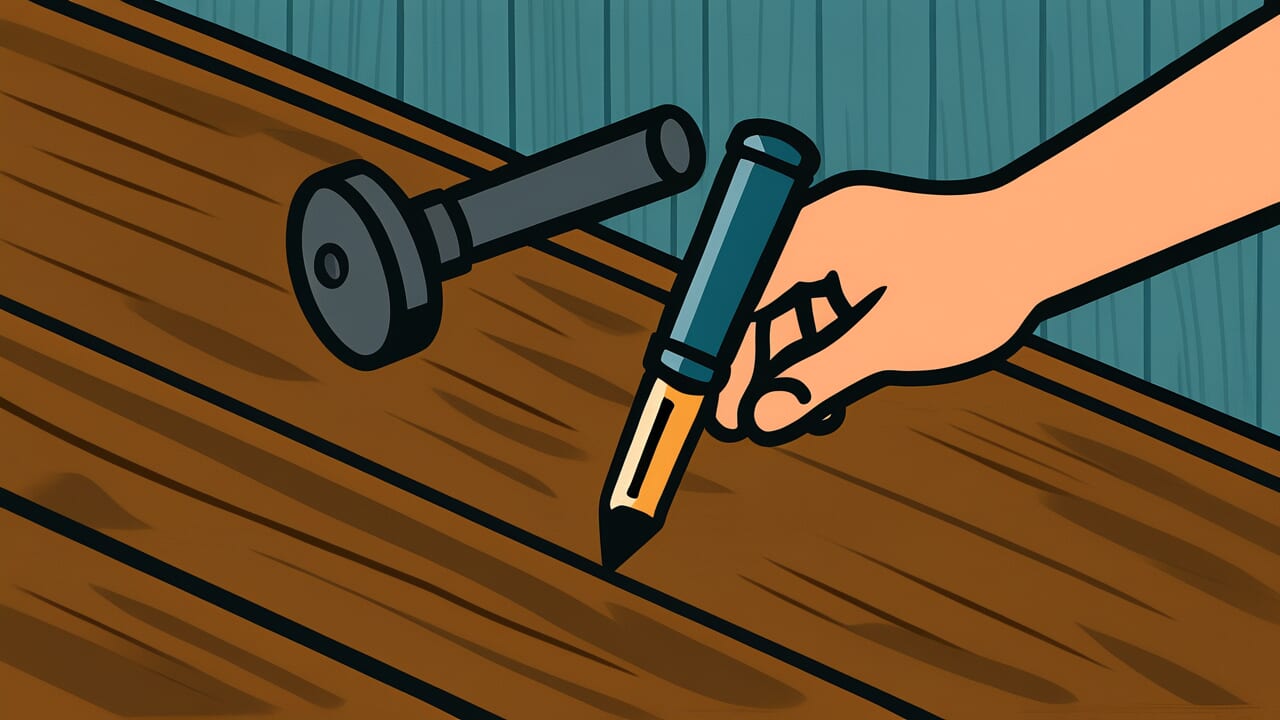How to Read “the nail that sticks out gets hammered down”
The nail that sticks out gets hammered down
[thuh NAYL that stiks owt gets HAM-erd down]
All words use standard pronunciation.
Meaning of “the nail that sticks out gets hammered down”
Simply put, this proverb means that people who stand out or act differently often face pressure to conform.
The saying uses the image of construction work. When building something, all nails must be flush with the surface. Any nail that sticks up gets hammered down to match the others. This creates a smooth, even finish. The proverb applies this idea to human behavior and social groups.
In daily life, this wisdom appears everywhere. Students who dress differently might face teasing. Workers who suggest new ideas sometimes get pushback from colleagues. People who speak up about problems often become targets themselves. The message is clear: standing out can be risky.
What makes this saying powerful is how it captures a uncomfortable truth. Most people want to belong and feel accepted. But this same desire can create pressure against anyone who seems different. The proverb doesn’t say whether this is good or bad. It simply observes what happens when someone breaks from the norm.
Origin and Etymology
The exact origin of this proverb is unknown, but it reflects ancient observations about group behavior.
Similar sayings appear in many cultures throughout history. The specific image of nails and hammering comes from carpentry and construction work. These trades have existed for thousands of years. Workers in these fields would have noticed how protruding nails needed to be hammered flat. Someone likely made the connection between this and human social behavior.
The proverb gained popularity because it describes something people recognize everywhere. In small villages, unusual behavior often drew attention and criticism. In larger communities, the same pattern appeared. The saying spread because it captured a universal human experience that transcends time and place.
Interesting Facts
The word “nail” comes from Old English “naegel,” which is related to similar words in other Germanic languages. This suggests the concept of nails as fasteners has ancient roots in European cultures.
Carpentry metaphors appear frequently in proverbs across many languages. The physical act of building creates natural comparisons to building character, relationships, or communities.
The phrase structure follows a simple cause-and-effect pattern that makes it easy to remember and repeat.
Usage Examples
- Manager to employee: “I’d keep those innovative ideas to yourself during the board meeting – the nail that sticks out gets hammered down.”
- Parent to teenager: “Maybe don’t correct your teacher in front of the whole class – the nail that sticks out gets hammered down.”
Universal Wisdom
This proverb reveals a fundamental tension in human nature between individual expression and group survival. Throughout history, communities that maintained unity and cooperation had better chances of surviving threats like wars, famines, and natural disasters. Members who disrupted group harmony could endanger everyone’s safety.
At the same time, human progress depends on individuals who think differently and challenge existing ways. New ideas, innovations, and improvements come from people willing to stick out. This creates an ongoing conflict between the need for stability and the need for growth. Groups benefit from conformity in the short term but need nonconformity for long-term success.
The proverb also reflects how social pressure operates automatically, without anyone planning it. When someone acts differently, others often respond with criticism or rejection instinctively. This happens because our brains are wired to notice differences and potential threats. The “hammering down” isn’t usually malicious. It’s a natural response that helped our ancestors maintain group cohesion when survival depended on everyone working together seamlessly.
When AI Hears This
Groups work like the human body fighting off germs. When someone acts differently, everyone automatically focuses on them. The group stops its normal work to deal with this “problem.” This happens even when the different person has good ideas. The community spends energy fixing what isn’t actually broken.
This explains why great inventors often come from outside established circles. Inside groups punish the very creativity they need to grow. People don’t realize they’re doing this harmful pattern. Their brains treat new ideas like dangerous infections. The group’s survival instinct accidentally destroys its own future success.
What fascinates me is how perfectly this system works despite seeming backwards. Groups that hammer down nails stay stable and united. Those creative “nails” either leave or adapt to fit in. This creates a natural sorting process. The rebels find new places where their ideas can grow. Meanwhile, stable groups get the harmony they unconsciously crave.
Lessons for Today
Understanding this wisdom helps navigate the balance between fitting in and being authentic. The key insight is recognizing that social pressure isn’t personal. When people react negatively to different behavior, they’re often responding to instinctive discomfort with change rather than making deliberate judgments about character.
For individuals, this awareness creates choices about when to conform and when to stand out. Sometimes blending in serves important goals like building trust or maintaining relationships. Other times, speaking up or acting differently becomes necessary despite the risks. The wisdom lies in making these decisions consciously rather than automatically.
In relationships and communities, this proverb reminds us to examine our own reactions to nonconformity. When someone acts differently, the first impulse might be to criticize or pressure them to change. But recognizing this pattern allows for more thoughtful responses. Supporting people who think differently, even when it feels uncomfortable, often leads to better outcomes for everyone involved. The goal isn’t to eliminate all social pressure, but to use it more wisely.



Comments